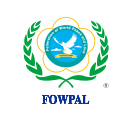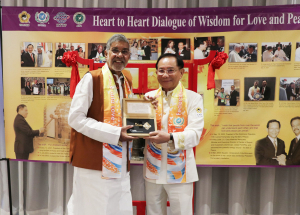Ringing FOWPAL’s Bell of Peace for the World: The Hopes and Actions of Dr. Hong, Tao-Tze and Nobel Peace Laureates
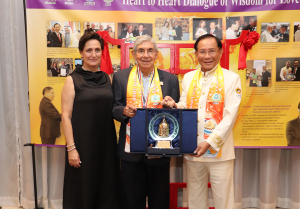 The 19th World Summit of Nobel Laureates for Peace, held in Nuevo León, Mexico, from September 18 to 21, 2024, brought together Nobel Peace Laureates, peacemakers, and leaders for panels, forums, and dialogues under the theme, “Peace and Progress: A Path to Collective Prosperity.” The summit aimed to enrich society, improve global cooperation, and create a new framework for lasting peace.
The 19th World Summit of Nobel Laureates for Peace, held in Nuevo León, Mexico, from September 18 to 21, 2024, brought together Nobel Peace Laureates, peacemakers, and leaders for panels, forums, and dialogues under the theme, “Peace and Progress: A Path to Collective Prosperity.” The summit aimed to enrich society, improve global cooperation, and create a new framework for lasting peace.
Dr. Hong, Tao-Tze, leader of Tai Ji Men and president of the Federation of World Peace and Love (FOWPAL), led a delegation to share the vision of the World Day of the Power of Hope. During the summit, a Bell of World Peace and Love ceremony was held, where six Nobel Peace Prize laureates rang the bell and made wishes for global peace, praying for harmony around the world.
As one of the world’s most renowned platforms for peace dialogue, the Summit was founded in 1999 by former Soviet leader Mikhail Gorbachev, who won the 1990 Nobel Peace Prize. Gorbachev was a pivotal figure in ending the Cold War, spearheading reforms that opened doors to peace and dialogue.
The 2024 World Summit of Nobel Laureates for Peace:
Declaration of World Day of the Power of Hope
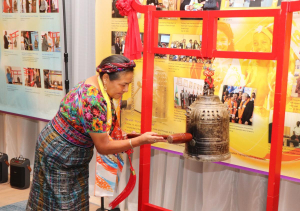 At the 19th World Summit of Nobel Laureates for Peace in 2024, six Nobel Peace Prize winners rang the Bell of World Peace and Love, offering their wishes for peace, extending blessings to the world, and harnessing the power of hope to actively promote global peace.
At the 19th World Summit of Nobel Laureates for Peace in 2024, six Nobel Peace Prize winners rang the Bell of World Peace and Love, offering their wishes for peace, extending blessings to the world, and harnessing the power of hope to actively promote global peace.
Rigoberta Menchú Tum, Nobel Peace Prize Laureate of 1992, rang the Bell and stated, “Que la paz sea armonía, equilibrio para que nos permita vivir en plenitud como seres felices." (May peace be harmony and balance, allowing us to exist joyfully and live a fulfilling life.) She is an Indigenous human rights activist and social advocate from Guatemala, recognized with the Nobel Peace Prize for her contributions to Indigenous rights and reconciliation among ethnic groups.
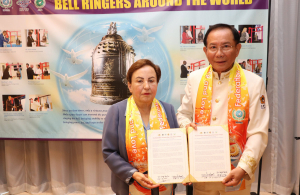 Shirin Ebadi, Nobel Peace Prize Laureate of 2003, rang the Bell and stated, "Wishing Peace for Korea and Unity of North and South Korea." She is an Iranian lawyer and human rights activist, founder of the Center for Defenders of Human Rights, and the first Iranian and Muslim woman to receive the Nobel Prize, recognized for her efforts in advocating for women’s and children’s rights.
Shirin Ebadi, Nobel Peace Prize Laureate of 2003, rang the Bell and stated, "Wishing Peace for Korea and Unity of North and South Korea." She is an Iranian lawyer and human rights activist, founder of the Center for Defenders of Human Rights, and the first Iranian and Muslim woman to receive the Nobel Prize, recognized for her efforts in advocating for women’s and children’s rights.
Leymah Gbowee, Nobel Peace Prize Laureate of 2011, rang the Bell and wished "That Every Human Person live in dignity–without fear." She was born and raised in Liberia and has worked to help those traumatized by the civil war, including child soldiers. She led a women’s peace movement that played a pivotal role in ending the war.
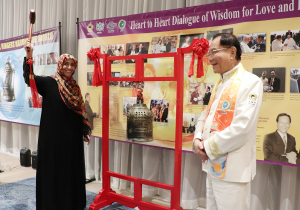 Tawakkol Karman, 2011 Nobel Peace Prize Laureate, rang the Bell and stated, “My wish is for peace, justice, freedom, democracy and rule of law.” She has been a leading advocate for women's rights, democracy, and peace in Yemen, emerging as a courageous leadership figure during the Arab Spring.
Tawakkol Karman, 2011 Nobel Peace Prize Laureate, rang the Bell and stated, “My wish is for peace, justice, freedom, democracy and rule of law.” She has been a leading advocate for women's rights, democracy, and peace in Yemen, emerging as a courageous leadership figure during the Arab Spring.
Kailash Satyarthi, Nobel Peace Prize Laureate of 2014, rang the Bell and stated, "Let us ignite the spark of compassion. Let us globalize compassion. Let us harness compassion for sustainable peace." He is an Indian social reformer dedicated to combating child labor and advocating for universal education. In 1980, he founded the Bachpan Bachao Andolan (BBA), which has freed over 80,000 child laborers.
Ouided Bouchamaoui, the 2015 Nobel Peace Prize Laureate and a member of the Tunisian National Dialogue Quartet, rang the Bell and said, “May God bless all of us.” Since receiving high recognition in Oslo, which brought fresh momentum to Tunisia’s democratic transition, Bouchamaoui has taken on the role of a Peace Emissary. She has traveled the world to underscore the importance of National Dialogue and to share Tunisia’s unique experience with the global community.
Dr. Hong, Tao-Tze presented each bell-ringer with a Certificate of Honor for ringing the Bell of World Peace and Love, sharing his vision of fostering a culture of peace with love and conscience. He also invited the Nobel Peace Laureates to sign the "Declaration of World Day of the Power of Hope," which received enthusiastic support.
Dr. Hong was instrumental in the United Nations’ adoption of the "International Day of Conscience." Recognizing that achieving global peace requires both a collective awakening of conscience and concrete acts of kindness, he continued promoting the "Declaration of World Day of the Power of Hope" in 2022. He brought this initiative to meetings and events in and around the United Nations headquarters in New York, and the Declaration has been signed by individuals in 173 countries as FOWPAL has been promoting it through its visits and cultural exchanges. Many world leaders, Nobel Peace Prize Laureates, and heads of NGOs have praised and endorsed this initiative.
The 17th World Summit of Nobel Peace Laureates in 2019:
Promoting the International Day of Conscience
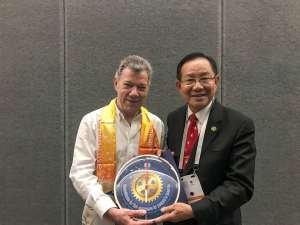 On July 25, 2019, during its 73rd session, the United Nations General Assembly passed a resolution designating April 5 as the International Day of Conscience. Dr. Hong, Tao-Tze, one of the key advocates for this initiative, attended the 17th World Summit of Nobel Peace Laureates in Mérida, Mexico from September 19 to 22, where he shared the concept of the International Day of Conscience, gaining support from many Nobel Peace Prize Laureates.
On July 25, 2019, during its 73rd session, the United Nations General Assembly passed a resolution designating April 5 as the International Day of Conscience. Dr. Hong, Tao-Tze, one of the key advocates for this initiative, attended the 17th World Summit of Nobel Peace Laureates in Mérida, Mexico from September 19 to 22, where he shared the concept of the International Day of Conscience, gaining support from many Nobel Peace Prize Laureates.
During the summit, Dr. Hong exchanged experiences on promoting peace with 12 Nobel Peace Prize Laureates, including former South African President Frederik Willem de Klerk (1993), American activist Jody Williams (1997), former Polish union leader Lech Walesa (1983), Guatemalan human rights activist Rigoberta Menchú Tum (1992), British politician Lord David Trimble (1998), Iranian lawyer Shirin Ebadi (2003), Yemeni journalist Tawakkol Karman (2011), Liberian peace activist Leymah Gbowee (2011), Indian social reformer Kailash Satyarthi (2014), former Colombian President Juan Manuel Santos (2016), and members of the Tunisian National Dialogue Quartet Abdessattar Ben Moussa and Ouided Bouchamaoui (2015).
During the event, Dr. Hong presented several Nobel Peace Prize Laureates with the "Compass Clock of Conscience," symbolizing time, direction, and purpose, as a reminder to practice conscience and good deeds in daily life. He also shared The History of International Day of Conscience, which documents Dr. Hong's collaboration with UN ambassadors from various countries in making the UN’s establishing April 5 as the International Day of Conscience possible, with the hope of creating a culture of peace with love and conscience.
FOWPAL’s Peace Bell Resonates with Conscience:
Nobel Peace Prize Laureates’ Wishes for Peace
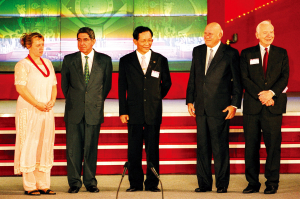 Ringing the Bell of World Peace and Love symbolizes a call to action. Bell ringers make wishes for love and peace for themselves, the world, and future generations. The peaceful resonance of the bell spreads across the earth, influencing critical moments in the world's destiny. As of Oct 5, 2024, 588 distinguished leaders from 150 countries have rung the Bell, including 72 heads of state and government and 15 Nobel Peace Prize Laureates.
Ringing the Bell of World Peace and Love symbolizes a call to action. Bell ringers make wishes for love and peace for themselves, the world, and future generations. The peaceful resonance of the bell spreads across the earth, influencing critical moments in the world's destiny. As of Oct 5, 2024, 588 distinguished leaders from 150 countries have rung the Bell, including 72 heads of state and government and 15 Nobel Peace Prize Laureates.
The Dalai Lama, 1989 Nobel Peace Prize Laureate, rang the Bell and stated, “Real peace must be developed from within. As such it is important to quell the fire of hatred. That also has to come through education.”
Former East Timorese President Jose Ramos-Horta, the 1996 Nobel Peace Prize Laureate, rang the Bell and wished for “world peace.” He was recognized for his work toward a peaceful solution to the conflict in East Timor.
Betty Williams, 1976 Nobel Peace Prize Laureate, rang the Bell and wished “Every child born in the world can live in peace, justice and freedom." She was honored for her efforts to achieve a peaceful resolution to the conflict in Northern Ireland.
Oscar Arias Sanchez, 1987 Nobel Peace Prize Laureate and former President of Costa Rica, rang the Bell and wished “for the whole world to enjoy peace.” He proposed a plan to put an end to the cruel civil wars that were devastating Central America.
Frederik W. De Klerk, the 1993 Nobel Peace Prize Laureate and former South African President, rang the Bell and stated, “We will achieve peace, through winning the war against poverty, through expanding democracy and through reaching out to each other.” He was instrumental in the abolition of South Africa's apartheid system.
Joseph Rotblat, the 1995 Nobel Peace Prize Laureate, rang the Bell and stated, “Remember your humanity.” He is a Polish-British physicist, committed to eliminating the threat of nuclear weapons.
Jody Williams, the 1997 Nobel Peace Prize Laureate, rang the Bell and stated, “Peace will prevail when individual’s and people’s voices are truly heard in determining their future.” She actively participated in the international campaign to ban landmines and promoted the signing of a convention, and jointly won the award with the International Campaign to Ban Landmines (ICBL).
Jerry White, the 1997 Nobel Peace Prize Laureate, expressed that ringing the significant Bell, which symbolizes peace across the universe and the world, was truly special and that he was proud to participate in the resonance of conscience. He stated, “I wish and pray and invite a landmine-free, nuclear-weapon-free, barrier-free, victim-free world at peace.”
Abdessattar Ben Moussa, 2015 Nobel Peace Prize Laureate, rang the Bell and shared his heartfelt aspiration for peace: "Love is the best ambassador of peace. This is why we wish for the achievement of peace through love and friendship, but the wish is not enough. This is why we must work to build a culture of peace through dialogue between peoples and protecting nature, condemning violence, hatred and racism and campaigning to stop wars and annihilate destructive weapons.”
Dr. Hong, Tao-Tze's Hopes and Actions:
Promoting Global Solidarity and Awakening of Conscience
 In the 21st century, the world faces more severe and complex challenges. In 2000, the United Nations held the Millennium Summit and set the Millennium Development Goals. At the same year’s 53rd UN DPI/NGO Conference, Dr. Hong, Tao-Tze delivered a speech on “Sharing the Vision of Economic and Social Development—The Urgency and Necessity of Global Solidarity and Cooperation,” which received enthusiastic responses. During the welcoming banquet, Dr. Hong shared his ideas of love and peace with then UN Secretary-General Kofi Annan. For years, Dr. Hong has shared his concepts of love and peace at numerous international conferences, promoted endorsement campaigns for key declarations, and actively engaged with UN ambassadors and NGOs from various countries to enhance consensus and cooperation.
In the 21st century, the world faces more severe and complex challenges. In 2000, the United Nations held the Millennium Summit and set the Millennium Development Goals. At the same year’s 53rd UN DPI/NGO Conference, Dr. Hong, Tao-Tze delivered a speech on “Sharing the Vision of Economic and Social Development—The Urgency and Necessity of Global Solidarity and Cooperation,” which received enthusiastic responses. During the welcoming banquet, Dr. Hong shared his ideas of love and peace with then UN Secretary-General Kofi Annan. For years, Dr. Hong has shared his concepts of love and peace at numerous international conferences, promoted endorsement campaigns for key declarations, and actively engaged with UN ambassadors and NGOs from various countries to enhance consensus and cooperation.
In 2014, Dr. Hong initiated the movement of "An Era of Conscience," and on August 17 of that year, a global launching ceremony for the Declaration for the Movement of An Era of Conscience was held in San Jose, USA. Since then, people from 200 countries and territories have signed the declaration. Starting on April 5, 2018, Dr. Hong, in collaboration with the Permanent Missions to the UN of Bahrain, Kiribati, Equatorial Guinea, and others, held over ten meetings at and around the UN headquarters in New York and the UN Office in Vienna to work on the draft resolution titled "Promoting the Culture of Peace with Love and Conscience." On July 25, 2019, during the 73rd session of the UN General Assembly, the resolution "Promoting the Culture of Peace with Love and Conscience" submitted by Bahrain was passed, designating April 5 as the International Day of Conscience. In 2023, Dr. Hong was awarded the President's Lifetime Achievement Award by U.S. President Joe Biden, recognizing him and the members of the Federation of World Peace and Love (FOWPAL) for contributing a total of 1.2 million hours of service to the U.S.
In 2024, the fifth International Day of Conscience was celebrated globally. On April 5, the United Nations headquarters in Geneva held seminars and musical events to mark the occasion, while on April 4, the World Leader Summit of Love and Peace was organized at the UN headquarters in New York. The summit was co-hosted by the Permanent Representative of Kiribati to the UN, Teburoro Tito, and Dr. Hong, Tao-Tze, President of FOWPAL, under the theme "Amplifying the Power of Hope for a Better World." The event was broadcast live globally via UN Web TV. Led by Dr. Hong, a cultural goodwill delegation composed of six organizations, including Tai Ji Men and FOWPAL, held a five-day celebration from April 3 to 7 at the UN headquarters in New York, as well as in New York and California, engaging participants from 63 countries. Former Ecuadorian President Rosalía Arteaga Serrano, Deputy Prime Minister of Kosovo Emilija Redzepi, and former Prime Minister of Lesotho Pakalitha Mosisili were among the visionary leaders who attended in person, along with nearly 100 attendees, including Mayor April Verlato of Arcadia, and other community leaders.
On April 3, a dinner and a ceremony of ringing the Bell of World Peace and Love were held at the Westin Hotel in New York. In his speech, Dr. Hong said that although the Earth and humanity are facing unprecedented challenges, if every global citizen adheres to their conscience, harnesses the power of hope, and practices good deeds, and if leaders confront the shared crises with compassion, courage, and wisdom, while actively seeking peaceful, harmonious, just, and win-win solutions to benefit the Earth and all people, these crises can be transformed into opportunities for positive change. By gathering the power of hope, humanity can be guided toward a sustainable future, with the hope that wars will cease, the pandemic will end, and people will enjoy safety and peace.
Hugues Sanon, special envoy of the COJEP International to the UN, and Dr. Bernard Fialkoff, president of the Americas Chapter of the Foundation for a Drug-Free World, on behalf of New York State Senator George Borrello and New York State Assemblyman Andrew Goodell, as well as various leaders and organizations, presented a Resolution to Dr. Hong, Tao-Tze, commending his selfless contribution to the world and declaring him as a Global Distinguished Peace Ambassador.
This award recognized his lifelong efforts, since founding Tai Ji Men Qigong Academy in 1966, in guiding his dizi (apprentices) to promote Tai Ji Men culture worldwide, contributing to social harmony, and enhancing people's physical, mental, and spiritual health, advancing the world toward love and peace. It also honored his founding of FOWPAL in 2000 in the U.S., through which he has spread the culture of love and peace via public service activities, gaining widespread global recognition and praise.
In the U.S., Dr. Hong was awarded honorary citizenships from four cities: Tacoma, Washington; Monterey Park, California; Honolulu, Hawaii; and Cupertino, California. Three cities have also designated special commemorative days in his honor: Washington, D.C. designated March 22, 2000, as "Tai Ji Men Qigong Academy Day," Honolulu, Hawaii designated September 16, 2001, as "Tai Ji Men Qigong Academy and Dr. Hong, Tao-Tze Day," and Berkeley, California designated August 5, 2005, as "Federation of World Peace and Love Day." He has also received numerous honors in Europe, Asia, Oceania, and Africa.
In 2024, Dr. Hong was awarded a Lifetime Achievement Award by the Creazione Cultural Association in Italy, recognizing his outstanding contributions to promoting world peace. He also received the 2024 Turin Global Peace Award, acknowledging his more than 50 years of tireless efforts in fostering cultural exchange, facilitating dialogues of wisdom, and promoting the culture of love and conscience for peace, as he traveled across five continents and over 100 countries in pursuit of world peace.
